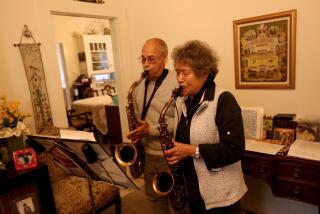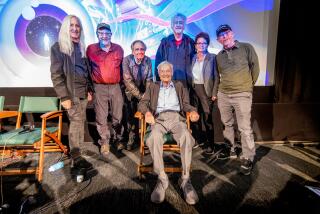Raphael Cordero devoted himself to helping the elderly. Now, he has AIDS, and they are helping him. : ‘Now, It’s Our Turn’
- Share via
Raphael Cordero points to walls filled with blown-up photographs--faces of people 100 years old and older. He was a teacher, a giver and a helper to these aged friends. Every day, for seven years, he visited their homes and convalescent centers, taking them flowers or clothing. He played the piano for them. He carried their fragile bodies out of wheelchairs and into bed. He took them on joy rides across Los Angeles and to birthday dinners at fancy hotels.
Now, Cordero, 40, a self-employed computer programmer, is shut in at home. For months he hasn’t made a “swing trip” to visit the people he calls “my kids.” At times, he barely has the strength to walk from his bed to the living room. Most of the time he sits in silence.
Cordero has AIDS--and the people he’s helped all these years are now helping him. Through them he’s learned about survival, courage, wisdom and love for life. He says he gains strength just from looking at their pictures, in the makeshift gallery he’s assembled in his Burbank home.
There’s Eva La Chapele, who died three years ago at 103. She taught him about living with dignity.
Percy Washington was the court jester. Before he died two years ago at 105, he taught Cordero never to lose his sense of humor.
And there’s Rachel Cohn, a firecracker at 102 who never leaves the Jewish Home for the Aged without the turquoise necklace Cordero gave her on her 100th birthday. She has helped him to appreciate being alive, even with AIDS. Says Cordero: “She has shown me how to listen to my heart, how to give joy to others, how not to worry about dying, to just continue living. My presence, my smile, my touch is all about celebrating life, about being a survivor.”
On this day--a good day for Cordero because he’s feeling healthy--Cohn and Dwight Edwin Chenault, 102, have come to visit.
Both know their friend’s body has been invaded with the human immunodeficiency virus (HIV). And they want him to know they are not scared. They want to touch him, embrace him, kiss him.
Chenault has been with Cordero from the start of his illness. In November, 1990, dressed in his finest pin-striped suit and bolo tie, he visited Cordero in the hospital. Cordero had slipped into a coma after he was stricken with pneumonia. He had a 104 fever and in four days went from 126 pounds to 99; that’s when he learned he had AIDS.
“I can’t get you out of my mind, Raphael,” Cohn says, her deeply wrinkled hands pressed against Cordero’s smooth face. “You have given me so much love, kindness and friendship. I pray for you and ask the good Lord to take care of you. You are a wonderful person. You’ve got to hang on for us.”
Cordero’s most recent hospital stay was shortly after Thanksgiving, when a bout with pneumonia lasted for several weeks. He has stopped taking AZT and had his last chemotherapy treatment last week. He is taking Pentamidine mist treatment to prevent pneumonia. And his weight is up to 111 pounds.
He says he is looking for “life in life, not for death in life. I’m not dying of AIDS, I’ve just been sick with it.”
Cordero’s interest in helping older people started when he was a boy living in New York City’s inner ghetto, surrounded by drugs, crime and violence. His mother, a single working parent, left her two children in the care of neighbors and friends, who were often much older.
Cordero remembers his baby-sitters, some old enough to be great-grandparents. “I would sit at their feet and listen to their great stories. When they finished they would always say, ‘School is the thing for you. Study. Study. Study. We believe in you,’ ” Cordero says, tears filling his eyes.
“Those people saved my life a million times over. Through them I got a shortcut to life.”
And a passion for service to the elderly.
Cordero co-founded the American Centenarian Committee, a national nonprofit organization, in 1986, after a friend asked him to help plan a birthday lunch for three people, all older than 100.
Later, he would fulfill birthday wishes for as many centenarians he could find:
On his 102nd birthday, Percy Washington wanted to meet Los Angeles Mayor Tom Bradley. Cordero arranged it.
Three years ago, Lottie Hicks, at 103, rode on a float in the Tournament of Roses parade. For her 101st birthday, Karen Carter flew in a helicopter. Grace Lyon, at 101, stood at the pitcher’s mound in Dodger Stadium and waved to 35,000 people. And Setrak Boyajian, 105 at the time, will never forget the special afternoon Cordero and a volunteer planned for him--a trip to the park to pet a dog, flirt with a 19-year-old woman and watch the sun set.
Most everyone who knows Cordero says the organization has survived because of him. They remember the time he sold his baby grand piano to cover a bill for the centenarians’ annual luncheon in May.
Mark Compton, who has been a committee volunteer for five years, sums up Cordero’s ability to make things happen in three words. “He is magic.”
Everyone agrees.
Chenault, who lives with his daughter in Eagle Rock, is sitting near Cordero, enjoying a fruit salad and hot tea. “He is simply a very compassionate young man,” Chenault says. “He has always been a friend to me. He talks to me, he listens, he cares.”
Cohn says she misses Cordero’s visits “an awful lot. . . . Now it’s our turn to take care of him.”
Their visit winds down. Cohn, Chenault and Cordero are tired--physically and emotionally.
As Cohn’s son lifts her from a chair onto her walker, Cordero, out of instinct, leaps to offer assistance. But his weakened body won’t allow him to do what he once did with ease.
“I can’t. I can’t,” he says, frustrated.
Cohn is helped, instead, by Cordero’s mother, Carmen, who moved in before Thanksgiving to care for her son.
“Listen to me, Raphael,” Cohn says. “Don’t do things you shouldn’t be doing. Take care of yourself. Eat well. Rest. I want you to have good health because I want you to come visit me.”
Cohn’s words revitalize him. He, too, misses the joy rides, the piano-playing, the hugs from his friends at nursing homes. And he says he has to get better because he has a museum to plan for the collection of photographs he has accumulated. And come May 20, he has a banquet to organize. He doesn’t know how he’s going to do it, because his health prevents him from trying to raise the $2,000 minimum needed for the banquet, and there’s only $11.90 in the committee’s two bank accounts.
But Cordero has faith.
“One of my centenarians asked me, ‘How do you feel about dying?’ I said, ‘Well, I have been very close to it,’ ” he says. Three months ago, he explains, his companion of 10 years died in his arms. He had AIDS.
“I’m not afraid of death. I know its face. I know its hands. I know its warmth,” he says recalling the moment his friend, 46, died.
“I’m not ready to go. I am still living,” Cordero says. “I have simplicity in life, my family, my community, my service to my centenarian friends. For me, this illness is only a temporary setback. I have to catch up and heal. I can’t die. I have a luncheon to plan.”


